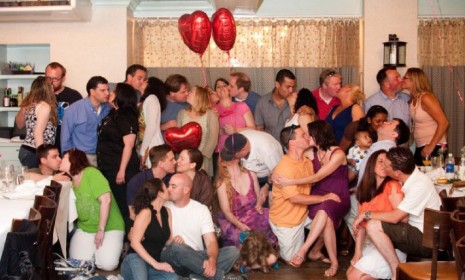The Financial Times' Match.com profile: 5 takeaways
The world of online dating is growing and evolving in strange, potentially creepy ways, says Financial Times media correspondent David Gelles

Online matchmaking has evolved from a niche service smacking vaguely of desperation to an increasingly effective, socially acceptable way to find a mate. And leading the way is pioneering dating site Match.com, says David Gelles in the Financial Times. Match, a part of digital media giant IAC's stable of sites since 1999, is keeping ahead of its competition by redefining how e-lovers find each other on the web. Here are five takeaways from Gelles' profile of the digital romance industry's leading purveyor of relationships:
1. This is not your father's online dating
Digital romance was "once a seedy corner of the internet," Gelles writes, but "online dating has come of age," and today it's "nearly as commonplace as e-commerce." Match is the world's largest dating site, and the company has learned a lot from data provided by the 75 million users it has logged since its founding in 1995. It currently has 1.78 million paying customers. And over the past two years, with much success, Match has rolled out an advanced profile-matching algorithm that recommends potential mates based as much on users' online actions as on what they say they're looking for.
The Week
Escape your echo chamber. Get the facts behind the news, plus analysis from multiple perspectives.

Sign up for The Week's Free Newsletters
From our morning news briefing to a weekly Good News Newsletter, get the best of The Week delivered directly to your inbox.
From our morning news briefing to a weekly Good News Newsletter, get the best of The Week delivered directly to your inbox.
2. People don't know what they want in a mate
The new algorithm, dubbed Synapse, has "taken the allure of online dating and amplified it," says Gelles. Instead of just running "a digital disco where it is easy to find lots of potential dates," Match now aspires to "get to know you, and what you want, better than you know yourself." And apparently that isn't too difficult. A woman might say she only wants to date men in their 20s, but if she often clicks on 30-something males — or even if users similar to her do — Match figures she is open to older men. "When we researched the data," says key Synapse developer Amarnath Thombre, it became clear that people's actions and their stated goals were "very different."
3. Not everyone finds their love online
Despite the algorithm's notable success, "not even the most potent computers in the world, it seems, can engineer a panacea for lonely hearts," Gelles notes, or stem the disappointment that comes from meeting someone face to face who oversold himself online. Plenty of Match love-seekers give up after one too many a bad date, or bad recommendations. "The Match algorithm should have figured out that I don't want a 45-year-old from New Jersey," says a 30-something professional woman from Manhattan. "Every time I log on I feel faintly insulted."
A free daily email with the biggest news stories of the day – and the best features from TheWeek.com
4. The stigma of online dating is all but gone
"Despite these concerns, it is becoming accepted wisdom that any lingering shame around online dating is gone," says Gelles. Roughly 40 million singles, out of 87 million in the U.S., have at least tried online dating, and surveys suggest that one in five relationships, and one in six new marriages, get their start online. "There's a tipping point happening," says Match.com U.S. president Mandy Ginsberg. There's no longer "this stigma...[that] it was 'good for my friends but not for me.'" Match is facing strong competition from rival services like eHarmony, FriendFinder, Jewish-oriented JDate, and OkCupid.
5. The success of dating sites lies with women
Match founder Gary Kremen says he designed the site with women in mind, and he really knew his venture was a success when his own girlfriend left him for another man she met on Match. "You have to design the whole system for women, not men," Kremen says. "Who cares what men think? So things like security and anonymity were important. And little things, like talking about body types, not pounds. Never ask a woman her weight."
-
 In Okinawa, experience the more tranquil side of Japan
In Okinawa, experience the more tranquil side of JapanThe Week Recommends Find serenity on land and in the sea
-
 The Iberian Peninsula is rotating clockwise
The Iberian Peninsula is rotating clockwiseUnder the radar We won’t feel it in our lifetime
-
 San Francisco tackles affordability problems with free child care
San Francisco tackles affordability problems with free child careThe Explainer The free child care will be offered to thousands of families in the city